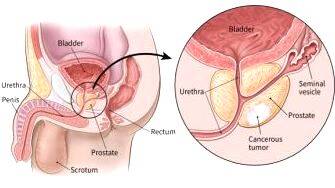




In this article I would like to present some information regarding Prostate Cancer, which is essentially a cancer that occurs in men and arises from the prostate gland.
What and where is the prostate?
The prostate is a walnut-sized gland located between the bladder and the penis. The prostate sits just in front of the rectum (the lower end of the bowel). The urethra (urine tube) runs through the center of the prostate, from the bladder to the penis, letting urine flow out of the body. The prostate secretes fluid that nourishes and protects sperm. During ejaculation, the prostate squeezes this fluid into the urethra, and it’s expelled with sperm as semen.
The Indian context
Prostate cancer is not the first health condition that would come to mind in the Indian health context given the competing health afflictions that are encountered in our population. However, if we narrow down to late middle age to elderly male population it certainly assumes relevance and is only likely to become more of a health concern for the society over the coming years as the average age of the population increases with increasing life expectancy along with the ongoing lifestyle and societal changes. With regards to prostate cancer statistics in India, although it is slightly patchy, still there is evidence that the incidence rates are roughly 10 times less than some of the western nations where they have robust data capture systems in place. This however needs to be looked at in perspective in that the relative diagnosis of early-stage prostate cancers are much higher in these countries as opposed to India where relative proportion of advanced prostate cancer cases are higher. This is related to the general higher level of social awareness of prostate cancer and hence individuals seeking medical consultation to discuss their concerns at much earlier stage.
Prostate cancers diagnosed early are highly curable with surgery or radiotherapy, with both modalities of treatment considered equally effective at getting rid of the cancer. However not all early prostate cancers may need treatment as some of them can be indolent and be monitored for a variable period of time before needing treatment. Countries like the United Kingdom,
where they have a very equitable healthcare system in place, do not routinely screen for prostate cancer, but offer it to men over the age of 50 years who after discussing with their health care provider are willing to go through with the diagnostic process seeing through the pros and cons of early diagnosis. This type of a selective approach would hopefully give us the opportunity to reduce the proportion of patients being diagnosed with advanced stages of prostate cancer which is more challenging to treat. As it stands currently this would seem a very prudent approach whereby men over the age of 50 years have a consultation with either their urologist or a radiation oncologist to discuss the pros and cons of screening for prostate cancer and come to a joint decision regard to proceeding or not.
What are the risk factors?
The most clear-cut risk factors for prostate cancer are advancing age and genetic makeup of the individual. There is other often quoted risk factors with a rather tenuous link if any and studies proving rather inconclusive such as obesity, smoking and diet.
What are the symptoms?
Possible symptoms of prostate cancer include frequent urination particularly at night, weak urinary flow, a sudden urge to urinate, pain or discomfort on passing urine or blood in urine. These symptoms are not specific for cancer though and can be caused by other benign conditions that can affect the prostate gland as well. In more advanced cancer symptoms can include bone pain from the back or pelvic area, reduced energy levels, unexplained weight loss etc.
How do we manage prostate cancer?
In patients seeking medical attention, the usual tests done are a PSA blood test, a physical examination including feeling the prostate through the back passage for any abnormalities, a MRI scan of the prostate and if required a prostate biopsy. If the results confirm a cancer, then management options are discussed based on the stage of the cancer, fitness of the individual and
their preferences. As mentioned previously localized cancers are highly curable with either surgery to remove the prostate or radiotherapy to the prostate alongside hormone treatment. The hormone treatment is meant to suppress the testosterone in the body which is known to fuel the growth of prostate cancers. If it happens to be an advanced cancer at presentation, then even though a complete cure may not be possible there are still very effective treatment options to keep the cancer under control for several years. On a positive note, prostate cancer treatments are constantly evolving and we do have today several treatment options that weren’t available in our arsenal against prostate cancers few years back and with the exponential growth in understanding of the biology and genetic basis of these cancers, the future treatment options are likely to get more effective and more targeted.
Dr Dhanasekaran Kittappa
Consultant Radiation Oncology
KIMS HEALTH Cancer Centre